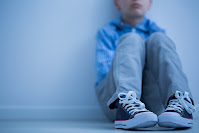
Young adults who experienced neglect as children may have more difficulty feeling pleasure than those who were abused, a study in Depression & Anxiety suggests.
“[Childhood trauma] exerts a lasting impact on cognition, emotion, and behavior in adulthood,” wrote Xiongzhao Zhu, Ph.D., of Central South University and colleagues. “Children who have experienced neglect may receive less attention and care from caregivers, resulting in less frequency of receiving feedback related to rewards and thus affecting reward learning.”
Anhedonia—the inability to feel pleasure or engage in enjoyable activities—is a common symptom in a variety of psychiatric illnesses, including major depressive disorder (MDD) and obsessive-compulsive disorder (OCD). Anhedonia may also point to those most likely to develop mental illness, the researchers noted.
To examine the relationship between anhedonia and childhood trauma, Zhu and colleagues recruited patients with MDD and OCD from a psychology clinic at a Second Xiangya Hospital in China as well as university students from four universities in China.
The participants completed the Childhood Trauma Questionnaire, which assesses neglect (emotional and physical) and abuse (emotional, physical, and sexual), as well as multiple assessments that measured various aspects of anhedonia. The final sample (average age 22 years) included 305 patients with MDD, 152 patients with OCD, and 2,110 university students.
Zhu and colleagues reported the following:
- Childhood trauma was reported by 69.8% of the MDD patients, 65.8% of the OCD patients, and 33.6% of the university students.
- Neglect was reported by 62.6% of the MDD patients, 55.3% of the OCD patients, and 30.0% of the university students; abuse was reported by 38.7% of the MDD group, 32.9% of the OCD group, and 9.00% of university students.
- Anhedonia subtypes, including physical anhedonia and social anhedonia, were reported by 72.5% to 82.5% of patients with MDD, 47.4% to 65.7% of patients with OCD, and 15.3% to 19.8% of the university students.
- Childhood neglect, not abuse, was associated with anticipatory and state anhedonia in OCD patients and anticipatory, consummatory, physical, and state anhedonia in MDD patients and university students.
“Regarding the more specific forms of [childhood trauma], emotional neglect had the strongest association with most aspects of anhedonia,” Zhu and colleagues wrote. “These findings highlight the role of neglect … in influencing anhedonia, which may provide insights into the mechanisms by which [childhood trauma] leads to psychopathology and suggest the importance of early interventions for families in such circumstances.”
(Image: iStock/KatarzynaBialasiewicz)
Don't miss out! To learn about newly posted articles in Psychiatric News, please sign up here.




